(完整版)初中主动语态与被动语态讲解.doc
初中英语被动语态讲解(精心整理)
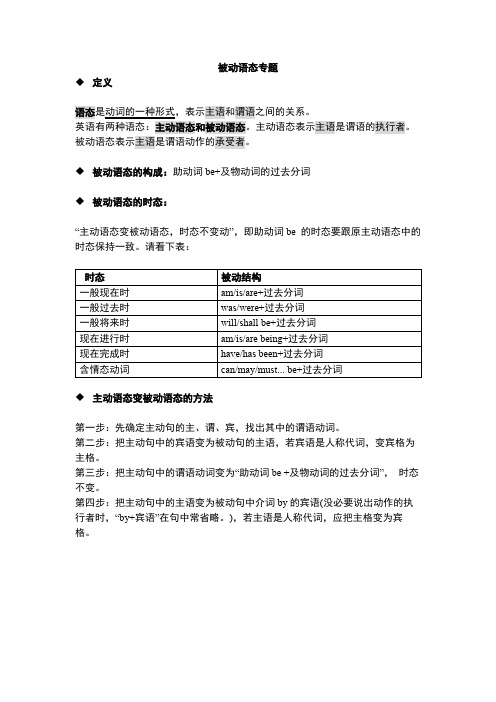
被动语态专题◆定义语态是动词的一种形式,表示主语和谓语之间的关系。
主动语态和被动语态。
主动语态表示主语是谓语的执行者。
被动语态表示主语是谓语动作的承受者。
◆被动语态的构成:助动词be+及物动词的过去分词◆被动语态的时态:“主动语态变被动语态,时态不变动”,即助动词be 的时态要跟原主动语态中的时态保持一致。
请看下表:◆主动语态变被动语态的方法第一步:先确定主动句的主、谓、宾,找出其中的谓语动词。
第二步:把主动句中的宾语变为被动句的主语,若宾语是人称代词,变宾格为主格。
第三步:把主动句中的谓语动词变为“助动词be +及物动词的过去分词”,时态不变。
第四步:把主动句中的主语变为被动句中介词by的宾语(没必要说出动作的执行者时,“by+宾语”在句中常省略。
),若主语是人称代词,应把主格变为宾格。
请对比下面的主动句和被动句:主动语态:They(主语)grow(谓语)tea(宾语)in the southeast of China.被动语态:Tea(主语)is grown(谓语)by them in the southeast of China.随堂演练(把下列句型改为被动句)1.Bruce writes a letter every week.→2.Li Lei mended the broken bike this morning.→3.We grow trees every spring.→4.My mother cleans our room every morning.→补充:①S + V +IO +DO双宾语的结构变为被动语态时,可把其中一个宾语变为被动语态的主语。
若将直接宾语变为主语,需根据习惯在原间宾语前加上介词to或for 。
用to的常见词有:give, show, send, lend, pass, pay, teach, throw, bring …….用for的常见词有:design, choose, sing, buy, get, cook ……随堂演练:(1)He gave me a book.→____________________________________(间接宾语作主语)→____________________________________ (直接宾语作主语)(2)My father bought me a new bike.→____________________________________(间接宾语作主语)→____________________________________ (直接宾语作主语)②S+ V+ O+ OC带复合宾语(宾语+宾语补足语)的结构变为被动语态时,只能将宾语变为被动语态的主语,宾语补足语不可变为主语。
初中英语动词的主动语态和被动语态讲解
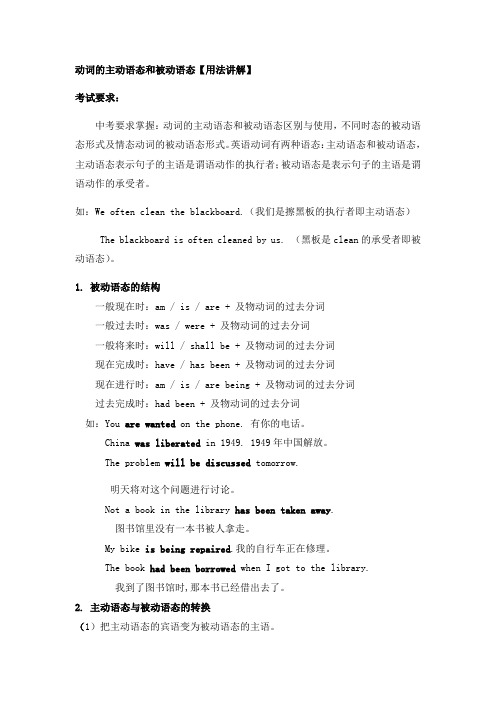
动词的主动语态和被动语态【用法讲解】考试要求:中考要求掌握:动词的主动语态和被动语态区别与使用,不同时态的被动语态形式及情态动词的被动语态形式。
英语动词有两种语态:主动语态和被动语态,主动语态表示句子的主语是谓语动作的执行者;被动语态是表示句子的主语是谓语动作的承受者。
如:We often clean the blackboard.(我们是擦黑板的执行者即主动语态)The blackboard is often cleaned by us. (黑板是clean的承受者即被动语态)。
1. 被动语态的结构一般现在时:am / is / are + 及物动词的过去分词一般过去时:was / were + 及物动词的过去分词一般将来时:will / shall be + 及物动词的过去分词现在完成时:have / has been + 及物动词的过去分词现在进行时:am / is / are being + 及物动词的过去分词过去完成时:had been + 及物动词的过去分词如:You are wanted on the phone. 有你的电话。
China was liberated in 1949. 1949年中国解放。
The problem will be discussed tomorrow.明天将对这个问题进行讨论。
Not a book in the library has been taken away.图书馆里没有一本书被人拿走。
My bike is being repaired.我的自行车正在修理。
The book had been borrowed when I got to the library.我到了图书馆时,那本书已经借出去了。
2. 主动语态与被动语态的转换(1)把主动语态的宾语变为被动语态的主语。
(2)把谓语变成被动结构(be+过去分词),根据被动语态句子里主语的人称和数,以及原来主动语态句子中动词的时态来决定be的形式。
初中英语2025届中考动词语态主动与被动语态知识讲解
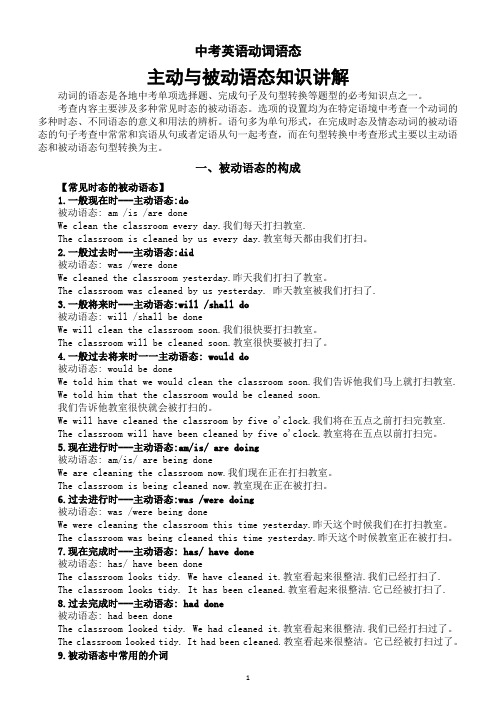
中考英语动词语态主动与被动语态知识讲解动词的语态是各地中考单项选择题、完成句子及句型转换等题型的必考知识点之一。
考查内容主要涉及多种常见时态的被动语态。
选项的设置均为在特定语境中考查一个动词的多种时态、不同语态的意义和用法的辨析。
语句多为单句形式,在完成时态及情态动词的被动语态的句子考查中常常和宾语从句或者定语从句一起考查,而在句型转换中考查形式主要以主动语态和被动语态句型转换为主。
一、被动语态的构成【常见时态的被动语态】1.一般现在时---主动语态:do被动语态: am /is /are doneWe clean the classroom every day.我们每天打扫教室.The classroom is cleaned by us every day.教室每天都由我们打扫。
2.一般过去时---主动语态:did被动语态: was /were doneWe cleaned the classroom yesterday.昨天我们打扫了教室。
The classroom was cleaned by us yesterday. 昨天教室被我们打扫了.3.一般将来时---主动语态:will /shall do被动语态: will /shall be doneWe will clean the classroom soon.我们很快要打扫教室。
The classroom will be cleaned soon.教室很快要被打扫了。
4.一般过去将来时一一主动语态: would do被动语态: would be doneWe told him that we would clean the classroom soon.我们告诉他我们马上就打扫教室.We told him that the classroom would be cleaned soon.我们告诉他教室很快就会被打扫的。
We will have cleaned the classroom by five o'clock.我们将在五点之前打扫完教室.The classroom will have been cleaned by five o'clock.教室将在五点以前打扫完。
初中被动语态讲解及练习
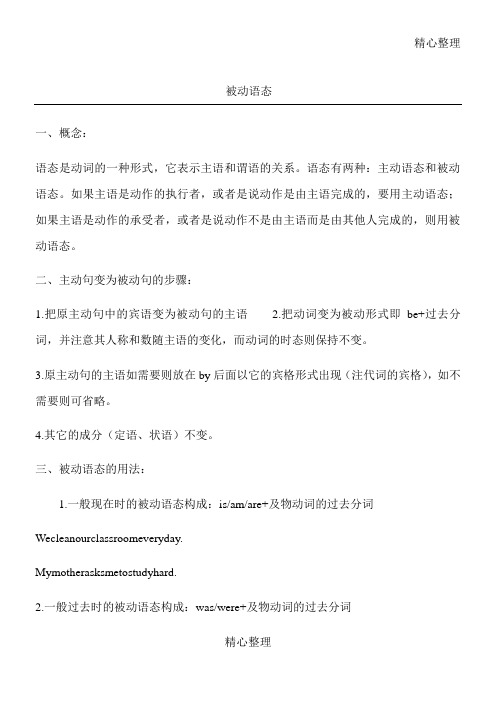
精心整理被动语态一、概念:语态是动词的一种形式,它表示主语和谓语的关系。
语态有两种:主动语态和被动1.3.,如不4.Wecleanourclassroomeveryday.Mymotherasksmetostudyhard.2.一般过去时的被动语态构成:was/were+及物动词的过去分词Anewshopwasbuiltlastyear.3.现在完成时的被动语态构成:has/have+been+及物动词的过去分词Thisbookhasbeentranslatedintomanylanguages.Manyman-madesatelliteshavebeensentupintospacebymanycountries.4.5.6.7.Therearetwobookstoberead. Therearetwentymoretreestobeplanted.3.感官动词或使役动词使用省略to的动词不定式,主动语态中不带to,但变为被动语态时,须加上to。
例:makesomebodydosomething→somebody+be+madetodosomething seesomebodydosomething→somebody+be+seentodosomething Agirlsawmywalletdropwhenshepassedby.→Mywalletwasseentodropbyagirlwhenshepassed by.ss.4.→Anewbikewasboughtfo rmebymyfather.5.一些动词短语用于被动语态时,动词短语应当看作一个整体,而不能丢掉其中的介词或副词。
Wecan’tlaughathim.→Hecan’tbelaughedatbyus.Helistenstotheradioeveryday.→Theradioislistenedtobyhimeveryday. Thenurseistakingcareofthesickman.→Thesickmanisbeingtakencareofbythenurse.不用被动语态的情况1)不及物动词或动词短语无被动语态(即多数的瞬间动词):束(错(对(错(对(错(对)Thepricehasbeenraised.(错)Pleaseseat.(对)Pleasebeseated.要想正确地使用被动语态,就须注意哪些动词是及物的,哪些是不及物的。
被动语态(讲解)(DOC)
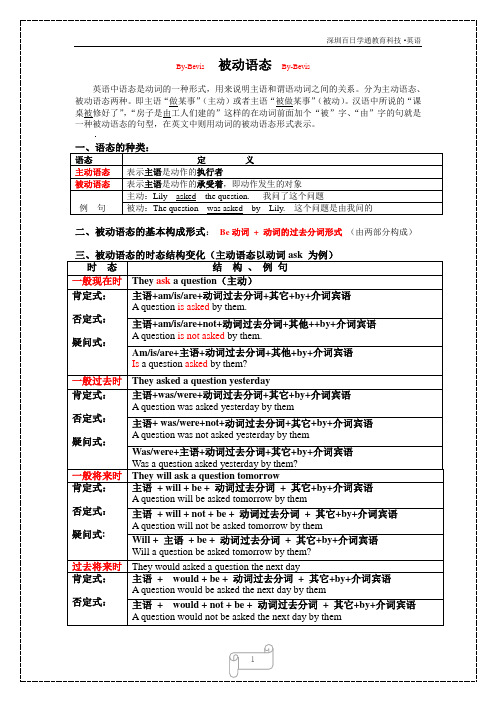
By-Bevis 被动语态By-Bevis英语中语态是动词的一种形式,用来说明主语和谓语动词之间的关系。
分为主动语态、被动语态两种。
即主语“做某事”(主动)或者主语“被做某事”(被动)。
汉语中所说的“课桌被修好了”,“房子是由工人们建的”这样的在动词前面加个“被”字、“由”字的句就是一种被动语态的句型,在英文中则用动词的被动语态形式表示。
一、语态的种类:语态定义主动语态表示主语是动作的执行者被动语态表示主语是动作的承受着,即动作发生的对象例句主动:Lily asked the question. 我问了这个问题被动:The question was asked by Lily. 这个问题是由我问的二、被动语态的基本构成形式:Be动词+ 动词的过去分词形式(由两部分构成)三、被动语态的时态结构变化(主动语态以动词ask 为例)时态结构、例句一般现在时They ask a question(主动)肯定式:否定式:疑问式:主语+am/is/are+动词过去分词+其它+by+介词宾语A question is asked by them.主语+am/is/are+not+动词过去分词+其他++by+介词宾语A question is not asked by them.Am/is/are+主语+动词过去分词+其他+by+介词宾语Is a question asked by them?一般过去时They asked a question yesterday肯定式:否定式:疑问式:主语+was/were+动词过去分词+其它+by+介词宾语A question was asked yesterday by them主语+ was/were+not+动词过去分词+其它+by+介词宾语A question was not asked yesterday by themWas/were+主语+动词过去分词+其它+by+介词宾语Was a question asked yesterday by them?一般将来时They will ask a question tomorrow肯定式:否定式:疑问式: 主语+ will + be + 动词过去分词+ 其它+by+介词宾语A question will be asked tomorrow by them主语+ will + not + be + 动词过去分词+ 其它+by+介词宾语A question will not be asked tomorrow by themWill + 主语+ be + 动词过去分词+ 其它+by+介词宾语Will a question be asked tomorrow by them?过去将来时They would asked a question the next day肯定式:否定式:主语+ would + be + 动词过去分词+ 其它+by+介词宾语A question would be asked the next day by them主语+ would + not + be + 动词过去分词+ 其它+by+介词宾语A question would not be asked the next day by them疑问式:Would + 主语+ be + 动词过去分词+ 其它+by+介词宾语Would a question be asked the next day by them?现在进行时They are asking a question now肯定式:否定式:疑问式:主语+ am/is/are + being +动词过去分词+其它+by+介词宾语A question is being asked now by them主语+am/is/are+being+not+动词过去分词+其它+by+介词宾语A question is being not asked now by them.Am/Is/Are+主语+being+动词过去分词+其它+by+介词宾语Is a question being asked now by them?过去进行时They were asking a question at that time肯定式:否定式:疑问式:主语+was/were+being+动词过去分词+其它+by+介词宾语A question was being asked at that time by them主语+was/were+being+动词过去分词+其它+by+介词宾语A question was being asked at that time by themWas/were+主语+being+动词过去分词+其它+by+介词宾语Was a question being asked at that time by them?现在完成时They have asked a question肯定式:否定式:疑问式:主语+have/has +been+动词过去分词+其它+by+介词宾语A question has been asked by them主语+have/has+not+been+动词过去分词+其它+by+介词宾语A question has not been asked by themHave/Has+主语+been+动词过去分词+其它+by+介词宾语Has a question been asked by them?过去完成时They had asked a question肯定式:否定式:疑问式:主语+had+been+动词过去分词+其它+by+介词宾语A question had been asked by them主语+ had+not+been+动词过去分词+其它+by+介词宾语A question had not been asked by themHad+主语+been+动词过去分词+其它+by+介词宾语Had aquestion been asked by them?情态动词They can ask a question肯定式:否定式:疑问式:主语+情态动词+be+动词过去分词+其它+by+介词宾语A question can be asked by them主语+情态动词+not+be+动词过去分词+其它+by+介词宾语A question can not be asked by them情态动词+主语+ +be+动词过去分词+其它+by+介词宾语Can a question be asked by them?be going to They are going to ask a question肯定式:否定式:疑问式:主语+be going to+be+动词过去分词+其它+by+介词宾语A question is going to be asked by them主语+ be going to +be+动词过去分词+其它+by+介词宾语A question is not going to be asked by themBe going to +主语+ +be+动词过去分词+其它+by+介词宾语Is a question going to be asked by them?练习:用横线划出下列句子的主语、谓语动词、宾语,并改成被动语态1.Students clean the classroom every day2. She is taking care of the children3. Someone has turned on the light4. They can finish all the work before July 20th5. We were building a new system now6. My cousin gave me a present last Christmas7. Our government will set up a new hospital next year8. She told them to wait her for a moment9. They are going to go over again this lesson this night10. She had handed in the paper before Miss wang came in四、主动语态与被动语态的互换1.主动语态:主语+ 谓语动词+ 宾语+ 状语Eg. We clean the classroom every day.被动语态:主语+ be+动词过去分词+ 状语+ by+介词宾语The classroom is cleaned every day by us2.主动语态:主语+ 谓语动词+ 间接宾语+ 直接宾语+ 状语He gave me five yuan yesterday被动语态:主语+ be + 动词过去分词+ 保留宾语(直宾/间宾) + 状语+ by介词宾语Eg. I was given five yuan yesterday by him Five yuan was given to me yesterday by him练习:将下列主动语态变成被动语态1. I write a letter every day2. Eli showed us a photo of his family(2种方法)3. He gave me a present4. We call her our good doctor5. They kept us waiting for a long time6. She will look after the children7. You should clean your room every day8. We respect our teachers五、被动语态的用法基本用法例句1.不知道或没必要说出动作的执行者时,by 短语常省略1.Paper was first invented in China.纸是中国首先发明的(不知是谁)2. Our school was set up in 2003我们学校是03年建立的(不必指明是谁建立的)2.强调动作的承受者时1.These boys are taken good care of by her. (强调这些孩子)这些孩子由她很好的照顾着2. Many houses were destroyed in the flood很多房屋被洪水摧毁3. 科技文献或新闻报道为体现客观性1. It is said that this disease is caused by a specific virus据报道,这种病是由一种特殊的病毒引起的4. 为表礼貌或委婉,避免提及动作执行者或说话人自己1. Smoking is not allowed in the library图书馆禁止吸烟2. Everybody is expected to obey the following rules希望大家遵守以下规定六、主动不能变被动的情况不能变被动的情况例句不及物动词作谓语We study hard 我们努力学习及物动词的宾语是表地点、处所、组织、国家等名称时1.He left his hometown ten years ago他10年前离开了家乡2.The students entered the classroom one by one学生们陆续地进了教室某些表状态或关系的及物动词、短语动词,只有主动语态四个“发生”:happen, take place, occur, break outLook like看起来像,mean意味着,own拥有,join参加,等…eg: In the past 30 years, great changes has taken plance in our country 在过去的30年,我们国家发生了巨大的变化There be句型There are a lot of deskes in the classroom教室里有许多桌子主系表句型He is a clever boy. 他是个聪明的男孩have作谓语动词We have three meals a day. 我们一日吃三餐反身代词作宾语He taught himself English.他自学英语相互代词作宾语They know each other. 他们彼此认识动名词、不定式作宾语1.They enjoy swimming with us他们喜欢和我们一起游泳2.She wants to be a teacher.她想成为一位老师There be句型There are a lot of desks in the classroom教室里有许多桌子七、用主动表被动的一些情况1. worth“值得”后接动词ing,用主动形式表被动意义The book is worth reading 这本书值得一读2系动词用主动表被动:smell闻起来,taste尝起来,look看起来,sound听起来,feel感觉起来The food tasted delicious. 这食物很好吃3.有些有及物动词转化的不及物动词,当主语为物时,由主动表被动:sell卖,write写,wash洗,wear穿,read读,等…The pen writes well这笔很好写The cloth washes well easily这布很容易洗注:1. A make / let / have B do “A使B做某事”变被动语态时需改成B is /are made/had/let to do…“B被迫做某事”eg: His parents make him study hard at home他父母让他每天努力学习He was made to study hard at home 他被迫在家努力学习2. Have sth done “让某事被做”, have后接物时,用动词过去分词形式表被动eg: I must have my bike repaired, it is broken. 我的单车坏了,我必须修理它练习:一、用动词的适当形式填空1. The War (break) out in 19372. Chinese (speak) by more and more people around the world3. We (tell)to close the windows before lefting the lab4. I don’t think sixteen-year-olds should (allow) to go to bars5. How long have Mr. And Mrs.David (marry) ?6. They (make) give up the picnic by the heavy rain7. This world can’t (understand) by the foreigners8. Lily’s bedroom is too dirty, she must have it (clean) now9. Workers (make) work from morning to night in the past10. All the work must (do) in two days11. The water is too dirty for us (swim)in.12. I often make him (laugh) druing the break time13. the trees (plant) in the park next Saturday?14. Thy often (help) each other15. She is a good cook, the fish (taste) delicious16. This beautiful song is wonderful , it worth (listen)17. Bikes widely (use) by Chinese18. When this kind of computer (use)?19. This kind of desk (make) of wood20. My brother (build) a new plane model these days二、按要求转换句型1. The book may be kept for two weeks. (对画线部分提问)the book ? 2. We have collected about one thousand models (对画线部分提问)Stamps collected?3.We must send her to a hospital at once (改为被动语态)must to a hospital at once4.You can renew the book for another week. (改为被动语态)The book for another week5. . Rice is grown in the south of China (改成主动语态,people作主语)in the south of China6. Your homework must be handed in today (改成主动语态)in your homework today7. the boy, the glass, by, broken, was (连词成句)8. factory, small, this, kind, made, is, a , bike, of, in (连词成句)9. 工人们在过去被迫一天工作12小时The workers for 12hours a day一、用动词的适当形式填空1. The War (break) out in 19372. Chinese (speak) by more and more people around the world3. We (tell)to close the windows before lefting the lab4. I don’t think sixteen-year-olds should (allow) to go to bars5. How long have Mr. And Mrs.David (marry) ?6. They (make) give up the picnic by the heavy rain7. This world can’t (understand) by the foreigners8. Lily’s bedroom is too dirty, she must have it (clean) now9. Workers (make) work from morning to night in the past10. All the work must (do) in two days11. The water is too dirty for us (swim)in.12. I often make him (laugh) druing the break time13. the trees (plant) in the park next Saturday?14. Thy often (help) each other15. She is a good cook, the fish (taste) delicious16. This beautiful song is wonderful , it worth (listen)17. Bikes widely (use) by Chinese18. When this kind of computer (use)?19. This kind of desk (make) of wood20. My brother (build) a new plane model these days二、按要求转换句型1. The book may be kept for two weeks. (对画线部分提问)the book ? 2. We have collected about one thousand models (对画线部分提问)Stamps collected?5.We must send her to a hospital at once (改为被动语态)must to a hospital at once6.You can renew the book for another week. (改为被动语态)The book for another week5. . Rice is grown in the south of China (改成主动语态,people作主语)in the south of China6. Your homework must be handed in today (改成主动语态)in your homework today7. the boy, the glass, by, broken, was (连词成句)8. factory, small, this, kind, made, is, a , bike, of, in (连词成句)9. 工人们在过去被迫一天工作12小时The workers for 12hours a day。
初中被动语态语法归纳Word版

初中英语被动语态一.语态概述1.语态是动词的一种形式,用以说明主语与谓语动词之间的关系。
英语中有两种语态:主动语态和被动语态。
2.主动语态表示主语是动作的执行者。
例如:Many people speak Chinese.谓语:speak的动作是由主语many people来执行的。
3.被动语态是动词的一种特殊形式,只有及物动词才有被动语态。
汉语往往用"被"、"受"、"给"等词来表示被动意义。
如:He opened the door.他打开了这扇门。
(主动语态)The door was opened.这扇门被打开了。
(被动语态)4.被动语态表示主语是动作的承受者,即行为动作的对象。
例如:Chinese is spoken by many people. 主语English是动词speak的承受者。
二、被动语态的构成被动语态由"助动词be+及物动词的过去分词"构成。
be有人称、数和时态的变化。
现以speak为例说明被动语态在各种时态中的构成。
一般现在时:am/is/are+spoken一般过去时:was/were+spoken一般将来时:will/shall be+spoken现在进行时:am/is/are being+spoken过去进行时:was/were being+spoken现在完成时:have/has been+spoken过去完成时:had been + spoken含有情态动词的被动语态含有情态动词的主动句变成被动句时,由"情态动词+be+过去分词"构成原来带to的情态动词变成被动语态后"to"仍要保留。
We can repair this watch in two days.This watch can be repaired in two days.They should do it at once. It should be done at once三.被动语态的用法1、不知道或没有必要指出谁是动作的执行者时。
(完整)初中英语被动语态讲解
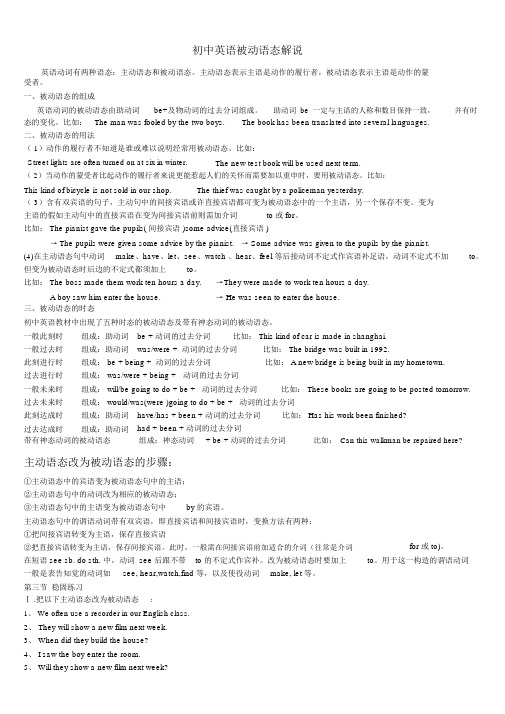
初中英语被动语态解说英语动词有两种语态:主动语态和被动语态。
主动语态表示主语是动作的履行者,被动语态表示主语是动作的蒙受者。
一、被动语态的组成英语动词的被动语态由助动词be+及物动词的过去分词组成。
助动词be一定与主语的人称和数目保持一致,态的变化。
比如:The man was fooled by the two boys.The book has been translated into several languages.二、被动语态的用法( 1)动作的履行者不知道是谁或难以说明经常用被动语态。
比如:并有时Street lights are often turned on at six in winter.The new test book will be used next term.( 2)当动作的蒙受者比起动作的履行者来说更能惹起人们的关怀而需要加以重申时,要用被动语态。
比如:This kind of bicycle is not sold in our shop.The thief was caught by a policeman yesterday.( 3)含有双宾语的句子,主动句中的间接宾语或许直接宾语都可变为被动语态中的一个主语,另一个保存不变。
变为主语的假如主动句中的直接宾语在变为间接宾语前则需加介词to 或 for。
比如: The pianist gave the pupils( 间接宾语 )some advice(直接宾语 )→The pupils were given some advice by the pianist. → Some advice was given to the pupils by the pianist.(4)在主动语态句中动词make、have、let、see、watch 、hear、feel 等后接动词不定式作宾语补足语,动词不定式不加to。
初中被动语态讲解
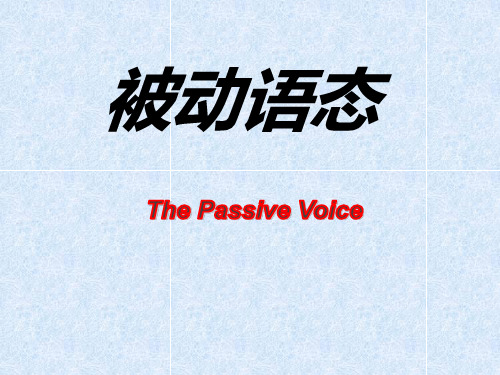
2 . 如果主动句中的谓语是短语动词 , 变为被动句 时 , 短语动词的介词或副词不可以丢掉 . 如 : They took good care of the boys .
The boys were taken good care of .
3 . 在 “ let , make , see , hear , notice , watch , feel ” 等动词后面做宾语补足语的动词不定式 不带 “ to ” , 但改成被动句时应加上 “ to ” . 如 : The doctor made me stay in bed for
主语+be going to + bhree bridges ____ since last year. A. have built B. were built C. have been built
现在完成时的被动语态:
主语+have/ has+ been + 过去分词
一般过去时的被动语态:
主语+was / were + 过去分词
[3]. More man-made satellites ____ in the future.
A. will send up B. will be sent up C. are sent up
一般将来时的被动语态: 主语+will + be + 过去分词
6. We often hear him play the guitar. He is often heard to play the guitar
1. Large numbers of plastic bags __a_r_e_u_s_e_d_ (use) in the supermarkets every day. 2. Our country _s_en__d(send) up another manmade satellite last year?
(完整版)被动语态构成及用法详解
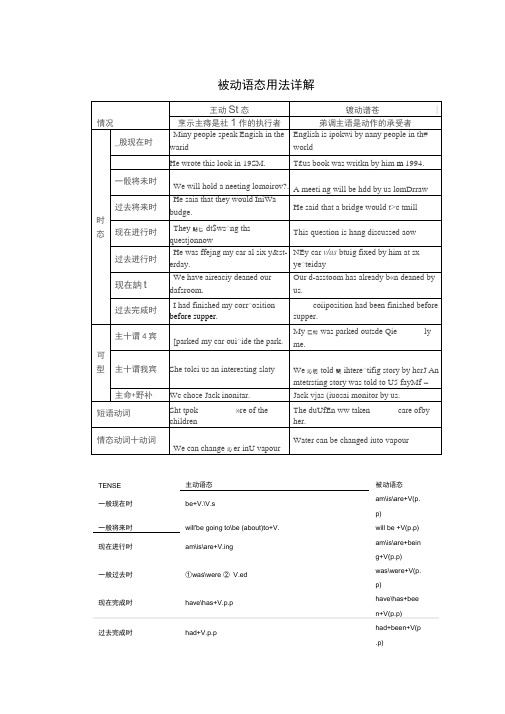
被动语态用法详解TENSE 主动语态被动语态am\is\are+V(p. 一般现在时be+V.\V.sp)一般将来时will'be going to\be (about)to+V. will be +V(p.p)am\is\are+bein 现在进行时am\is\are+V.ingg+V(p.p)was\were+V(p. 一般过去时①was\were ② V.edp)have\has+bee 现在完成时have\has+V.p.pn+V(p.p)had+been+V(p 过去完成时had+V.p.p.p)was\were+bein 过去进行时was\were+V.ingg+V(p.p)情态动词情态动词情态动词+V.+be+V(p.p)被动语态牢记一点,be加动词过去分词。
分析句中主和谓,承受者作主语即被动。
短语动词不可忘介、副词。
另有不及物动词,只有主动无被动。
还要注意其时态,与主动语态全相同。
不用被动语态的情况1)不及物动词或动词短语无被动语态(即多数的瞬间动词):appear, die (死亡),disappea((消失),end (vi. 结束),fail, happen, last, lie, remain, sit, spread, stand break out, come true, fall asleep, keep silenee, lose heart, take place. After the fire, very littleremained of my house. 比较:rise, fall, happen 是不及物动词;raise, seat是及物动词。
(错)The price has been risen.(对)The price has risen.(错)The accident was happened last week.(对)The accident happened last week.(错)The price has raised.(对)The price has been raised.(错)Please seat.(对)Please be seated.要想正确地使用被动语态,就须注意哪些动词是及物的,哪些是不及物的。
主动语态和被动语态

主动语态和被动语态
主动语态和被动语态是语法中的两种不同的句式结构,它们在句子
中的主语和谓语之间的关系不同。
在主动语态中,主语是动作的执行者,而被动语态中,主语是动作的承受者。
接下来我们将详细讨论主
动语态和被动语态的区别,以及它们在实际应用中的用法。
主动语态是指句子的主语执行动作的句式结构。
比如:“小明吃了
一个苹果。
”这个句子中,主语“小明”是动作的执行者,动词“吃”表示
了主语的动作。
主动语态通常用于强调动作的执行者,突出动作的主
动性。
相比之下,被动语态是指句子的主语是动作的承受者的句式结构。
比如:“这个苹果被小明吃了。
”这个句子中,主语“这个苹果”是动作“吃”的承受者,动词“吃”前面加上了“被”,表示了动作的被动性。
被动
语态通常用于强调动作的接受者,或者强调动作对主语的影响。
在实际应用中,主动语态和被动语态的选择取决于句子中的重点和
表达的方式。
如果要强调动作的执行者或者主语的主动性,就可以使
用主动语态;如果要强调动作的承受者或者主语的被动性,就可以使
用被动语态。
此外,被动语态还可以用于不知道执行动作的具体人物,或者为了避免指责或强调动作本身。
总的来说,主动语态和被动语态是语法中不可或缺的两种句式结构,它们在表达方式和语气上有不同的特点。
合理运用主动语态和被动语
态可以使句子更加丰富多彩,准确表达作者的意图。
希望通过本文的
讨论,读者对主动语态和被动语态有了更清晰的认识。
(word版)初中英语语法被动语态
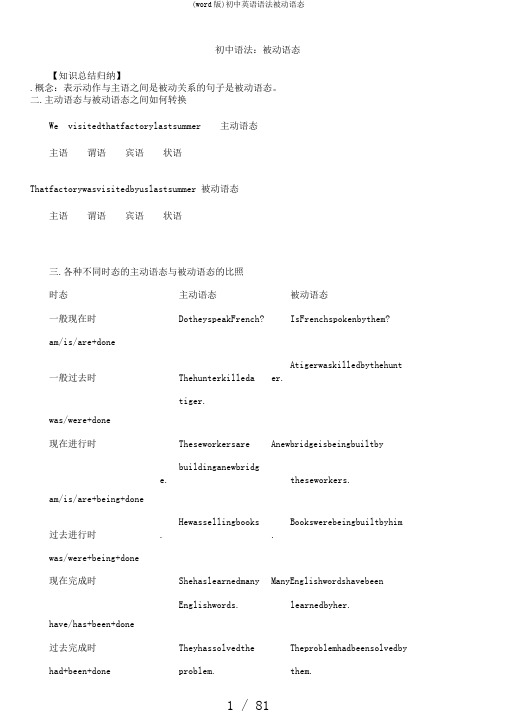
初中语法:被动语态【知识总结归纳】.概念:表示动作与主语之间是被动关系的句子是被动语态。
二.主动语态与被动语态之间如何转换We visitedthatfactorylastsummer 主动语态主语谓语宾语状语Thatfactorywasvisitedbyuslastsummer 被动语态主语谓语宾语状语三.各种不同时态的主动语态与被动语态的比照时态主动语态被动语态一般现在时DotheyspeakFrench?IsFrenchspokenbythem?am/is/are+done一般过去时ThehunterkilledaAtigerwaskilledbythehunt er.was/were+donetiger.现在进行时Theseworkersare Anewbridgeisbeingbuiltbyam/is/are+being+donebuildinganewbridge.theseworkers.过去进行时Hewassellingbooks.Bookswerebeingbuiltbyhim.was/were+being+done现在完成时Shehaslearnedmany ManyEnglishwordshavebeen have/has+been+doneEnglishwords.learnedbyher.过去完成时Theyhassolvedthe Theproblemhadbeensolvedby had+been+done problem.them.一般将来时Ishallmakeaplan.Aplanwillbemadebyme. shall/willbe+done过去将来时Hetoldmetheywould Hetoldmetheroomwouldbepainttheroom.paintedbythem. wouldbe+done情态动词Weshouldhandinour Ourhomeworkshouldbehandedcan/may/must/shouldhomework.inbyus.+be+done.如何正确使用被动语态有些动词带有两个宾语,即直接宾语和间接宾语,变被动语态时,可把其中一个宾语变成主语,另一个留在被动结构谓语后面。
初中英语被动语态总结(完整版)

初中英语被动语态总结A.熟记结构被动语态的结构为“助动词be+及物动词的过去分词(p.p)”。
被动语态的不同时态是通过be 的时态变化来表示的,其人称和数方面应与主语保持一致。
其具体变化为:一般现在时:am/is/are+p.p.一般过去时:was/were+p.p.一般将来时:shall /will be +p.p.现在完成时:have /has been +p.p.现在进行时:am/is/are+being+p.p.过去将来时:should /would be +p.p.含情态动词的被动结构:情态动词+be+p.p.例如:① Chinese ______ by the largest number of people.A.speak B.is speaking C.speaks D.is spoken② The boy ______ to get supper ready after school.A.were told B.is telling C.was told D.tells③ A lot of new roads ______ built in the west of China.A.must B.must be C.has D.haveB.明确用法被动语态常用于以下两种情况:1.不知道谁是动作的执行者,或者没有必要指出谁是动作的执行者;2.强调动作的承受者。
例如:这棵树是那个男孩弄断的。
The tree ______ ______ by that boy.C.熟练转换1.将主动语态变被动语态的基本方法为:①将主动语态的宾语作被动语态的主语;②谓语动词变为“be+及物动词的过去分词”,并通过be的变化来表达出不同的时态;③主动语态的主语变为介词by的宾语,组成介词短语放在被动结构中的谓语动词之后。
(有时by短语可以省略)。
2.被动语态的一般疑问句是将一个助动词置于主语之前;否定句是在第一个助动词后加not;特殊疑问句的语序为:疑问词+一般疑问句。
主动语态和被动语态

主动语态和被动语态1、主动语态:主语是动作的执行者(即某人做某事),叫主动语态。
被动语态:主语是动作的承受者(即某事被做),叫被动语态。
主动与被动的区别:不是词序的区别,而是主语与谓语意义上的区别。
在英语中只有及物动词和一些相当于及物动词的词组才有被动语态的形式。
2、被动语态结构:助动词be +动词的过去分词+(by+动作的执行者)。
助动词be有时态、人称和数的变化。
被动语态后的by短语有时可省去。
具体结构见下表:[注] p.p.表示过去分词。
3、被动语态的用法:①不知道谁是动作的执行者(即不知道谁做)时用被动语态,省略by短语。
如:A man was killed in the accident. 一个人死于事故This window was broken yesterday. 这扇窗子是昨天被打破的②不说或者众所周知是谁做时,用被动语态,省略by短语。
如:Rice is also grown in this place. 这个地方也种水稻。
A railroad will be built here in three years. 三年之后这里将要修建一条铁路。
③强调动作的承受者,句尾加by短语。
如:It was written by Lu Xun. 它(书)是鲁迅写的。
A pet dog is never killed by its owner. 宠物狗是不会被主人宰杀的。
4、主动语态如何改写为被动语态:(动作的承受者) (be +过去分词) (动作的执行者)5、中考注意点:①―动词+间接宾语+直接宾语‖改为被动时:可以用间接宾语做被动句的主语。
如:His teacher gave him a dictionary. 老师给他一本字典。
→He was given a dictionary by his teacher. 他得到老师一本字典。
也可以用直接宾语做被动句的主语,但是需用to或者for引出原句的间接宾语。
初中英语主动语态和被动语态(共21张PPT)
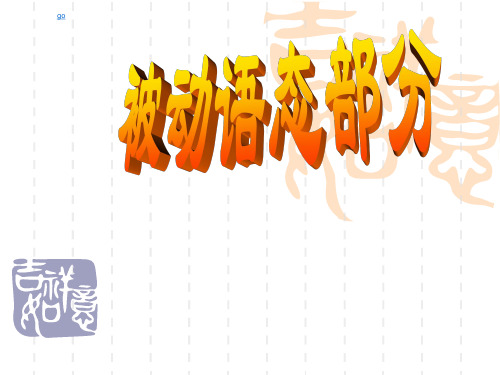
sb be watched to do
观
sth
动 hear sb do sth 词
sb be heard to do sth
notice sb do sth sb be noticed to do sth
②含有短语的被动语态结构。
一般来说,只有及物动词才有被动语态,因为只有及物动词才有承 受者。
但许多不及物动词加上副词或介词构成动词短语也相当于及物动词的用 法,可以
③We have learned 3000 English words so far.(主动) → 3000 English words have been learned by us so far.
Fill in the blanks with the Passive Voice.
1、Tea i_s_g_r_o_w__n (grow) in Fujian. 2、Chinese _i_s_s_p_o__k_e_n_ (speak) in China. 3、The bed ___is__u_s_e_d__ (use) for sleeping. 4、Our classroom _i_s_c_le_a_n__e_d (clean) every day. 5、The cars _a_r_e__m_a_d_e__ (make) in Beijing.
什么时候要用被动语态呢? 在下列三种情况之一要用被动语态: ①不知道动作的执行者是谁,用被动语态。 ②没有必要指出谁是动作的执行者,用被动
语态。 ③需要强调动作的承受者时,用被动语态
主动句中谓语动词的发出者由by引出,作为by的宾语,也可以省略。
请看以下主动语态和被动语态结构的转换:
主动语态:主语+谓语+宾语
初中英语语法被动语态(2021年整理)
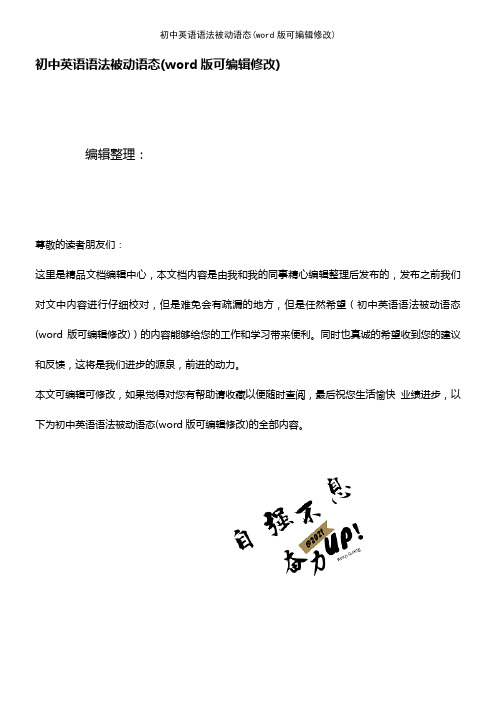
初中英语语法被动语态(word版可编辑修改)编辑整理:尊敬的读者朋友们:这里是精品文档编辑中心,本文档内容是由我和我的同事精心编辑整理后发布的,发布之前我们对文中内容进行仔细校对,但是难免会有疏漏的地方,但是任然希望(初中英语语法被动语态(word版可编辑修改))的内容能够给您的工作和学习带来便利。
同时也真诚的希望收到您的建议和反馈,这将是我们进步的源泉,前进的动力。
本文可编辑可修改,如果觉得对您有帮助请收藏以便随时查阅,最后祝您生活愉快业绩进步,以下为初中英语语法被动语态(word版可编辑修改)的全部内容。
初中语法:被动语态【知识总结归纳】一. 概念:表示动作与主语之间是被动关系的句子是被动语态。
二。
主动语态与被动语态之间如何转换We visited that factory last summer →主动语态主语谓语宾语状语That factory was visited by us last summer →被动语态主语谓语宾语状语三. 各种不同时态的主动语态与被动语态的对比四. 如何正确使用被动语态1. 有些动词带有两个宾语,即直接宾语和间接宾语,变被动语态时,可把其中一个宾语变成主语,另一个留在被动结构谓语后面。
需要注意的是:若把直接宾语变成被动语态的主语,需要在间接宾语之间加上介词“to”。
eg 。
He often tells us interesting stories 。
(主动语态)⎭⎬⎫.him by us to told often are stories g Interestin .him by stories g interestin told often are We (被动语态) ▲常带双宾语的词有:give, tell , show , lend , pass 等。
2。
在行为动词have ,make ,let 以及感官动词see ,watch ,notice,feel 等后面不定式作宾语补语时,在主动结构中to 被省略,但在被动语态中,要加to.eg 。
(完整版)初中英语语法归纳:被动语态
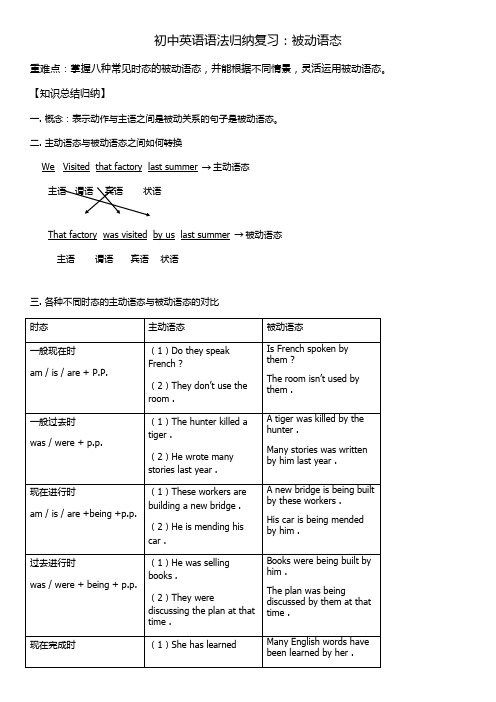
初中英语语法归纳复习:被动语态重难点:掌握八种常见时态的被动语态,并能根据不同情景,灵活运用被动语态。
【知识总结归纳】一. 概念:表示动作与主语之间是被动关系的句子是被动语态。
二. 主动语态与被动语态之间如何转换We Visited that factory last summer →主动语态主语谓语宾语状语That factory was visited by us last summer →被动语态主语谓语宾语状语三. 各种不同时态的主动语态与被动语态的对比四. 如何正确使用被动语态1. 有些动词带有两个宾语,即直接宾语和间接宾语,变被动语态时,可把其中一个宾语变成主语,另一个留在被动结构谓语后面。
需要注意的是:若把直接宾语变成被动语态的主语,需要在间接宾语之间加上介词“to ”。
eg. He often tells us interesting stories . (主动语态)⎭⎬⎫.him by us to told often are stories g Interestin .him by stories g interestin told often are We (被动语态) ▲常带双宾语的词有:tell , show , lend , pass 等。
2. 在主动语态中,某些动词之后带有复合宾语,即宾语和宾语补足语,这个复合宾语由动词不定式来充当,to 被省略,但在被动语态中,这个to 还要还原。
eg. I often hear her sing this popular song . (主动语态)4434421复合宾语宾语补足语宾语She is often heard to sing this popular song .(被动语态)▲ 有这种用法的常用动词有:make , let , see , hear , watch , feel , notice 等。
3. 有些“be +过去分词”的结构并不是被动语态,它们有可能是“系表结构(即系动词之后由过去分词来充当表语)。
归纳初中语法中的被动语态与主动语态总结
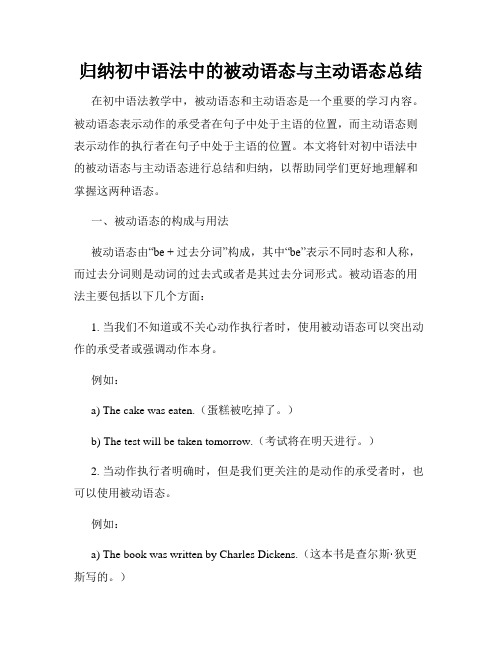
归纳初中语法中的被动语态与主动语态总结在初中语法教学中,被动语态和主动语态是一个重要的学习内容。
被动语态表示动作的承受者在句子中处于主语的位置,而主动语态则表示动作的执行者在句子中处于主语的位置。
本文将针对初中语法中的被动语态与主动语态进行总结和归纳,以帮助同学们更好地理解和掌握这两种语态。
一、被动语态的构成与用法被动语态由“be + 过去分词”构成,其中“be”表示不同时态和人称,而过去分词则是动词的过去式或者是其过去分词形式。
被动语态的用法主要包括以下几个方面:1. 当我们不知道或不关心动作执行者时,使用被动语态可以突出动作的承受者或强调动作本身。
例如:a) The cake was eaten.(蛋糕被吃掉了。
)b) The test will be taken tomorrow.(考试将在明天进行。
)2. 当动作执行者明确时,但是我们更关注的是动作的承受者时,也可以使用被动语态。
例如:a) The book was written by Charles Dickens.(这本书是查尔斯·狄更斯写的。
)b) The movie was directed by Steven Spielberg.(这部电影是史蒂文·斯皮尔伯格导演的。
)3. 在官方文件、新闻报道等正式场合中,被动语态常常被使用。
例如:a) The suspect was arrested by the police.(嫌疑犯被警察逮捕了。
)b) The new law will be introduced next month.(新法规将于下个月实施。
)二、主动语态的构成与用法主动语态即为我们常见的句子结构,动作的执行者在句子中处于主语的位置。
主动语态的构成与用法如下:1. 主动语态的一般现在时形式为:主语 + 动词原形 + 其他成分。
例如:a) I read books every day.(我每天都读书。
英语语法主动语态和被动语态.doc
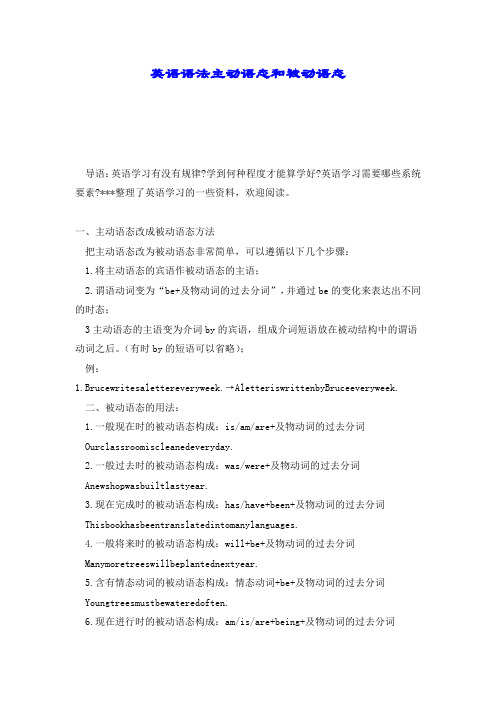
英语语法主动语态和被动语态导语:英语学习有没有规律?学到何种程度才能算学好?英语学习需要哪些系统要素?***整理了英语学习的一些资料,欢迎阅读。
一、主动语态改成被动语态方法把主动语态改为被动语态非常简单,可以遵循以下几个步骤:1.将主动语态的宾语作被动语态的主语;2.谓语动词变为“be+及物动词的过去分词”,并通过be的变化来表达出不同的时态;3主动语态的主语变为介词by的宾语,组成介词短语放在被动结构中的谓语动词之后。
(有时by的短语可以省略);例:1.Brucewritesalettereveryweek.→AletteriswrittenbyBruceeveryweek.二、被动语态的用法:1.一般现在时的被动语态构成:is/am/are+及物动词的过去分词Ourclassroomiscleanedeveryday.2.一般过去时的被动语态构成:was/were+及物动词的过去分词Anewshopwasbuiltlastyear.3.现在完成时的被动语态构成:has/have+been+及物动词的过去分词Thisbookhasbeentranslatedintomanylanguages.4.一般将来时的被动语态构成:will+be+及物动词的过去分词Manymoretreeswillbeplantednextyear.5.含有情态动词的被动语态构成:情态动词+be+及物动词的过去分词Youngtreesmustbewateredoften.6.现在进行时的被动语态构成:am/is/are+being+及物动词的过去分词UncleWangismendingmybikenow.→MybikeisbeingrepairedbyTomnow.7.不定式的被动语态:to+be+及物动词的过去分词Therearetwobookstoberead.→Therearetwentymoretreestobeplanted.三、使用被动语态应注意的几个问题:1.不及物动词无被动语态。
- 1、下载文档前请自行甄别文档内容的完整性,平台不提供额外的编辑、内容补充、找答案等附加服务。
- 2、"仅部分预览"的文档,不可在线预览部分如存在完整性等问题,可反馈申请退款(可完整预览的文档不适用该条件!)。
- 3、如文档侵犯您的权益,请联系客服反馈,我们会尽快为您处理(人工客服工作时间:9:00-18:30)。
主动语态与被动语态
一.概念 : 主动语态表示主语是动作的执行者 ,被动语态表示主语是动作的承受者。
二.被动语态的构成:助动词 be+及物动词的过去分词
三.被动语态的时态 :以为 work 例:
1.一般现在时 : am / is/are+ worked
2.一般过去时 : was / were+ worked
3.一般将来时 : shall / will +be+ worked
4.过去将来时 : should / would+be+ worked
5.现在进行时 : am /is/are+ being+ worked
6.过去进行时 : was /were+ being+ worked
7.现在完成时 : have/has+ been+ worked
8.过去完成时 : had +been+ worked
9.将来完成时 : shall/ will +have been +worked
10.过去将来完成时 : should/would +have been+ worked
11.情态动词 (can/may/must/should etc.)+be+动词的过去分词
四.用法:当我们不知道谁是动作的执行者或者没有必要指出谁是动作
的执行者时或者只需强调动作的承受者时,要用被动语态。
五.方法: Many people speak English.主(动语态 )
English is spoken by many people(.被动语态)
六.注意以下问题:
A. 带有双宾语的动词变为被动语态时,可以把其中一个宾语变为被动
语态的主语,若将直接宾语 (sth.)变为主语,须根据习惯在原间接宾语
前加上介词 to 或 for
用to 的常见词有: give, show, send, lend, pass, pay, teach, throw, take, bring etc.
用for 的常见词有: make, choose, sing, play, draw, save, buy, get, leave, cook etc.
eg. 1. Mary gave him some books. He was
given some books by Mary. Some
books were given to him by Mary.
2.Her father bought her a new bike. She
was bought a new bike by her father.
A new bike was bought for her by her father.
B.带复合宾语(宾语 +宾语补足语)的动词变为被动语态时,只能将
宾语变为被动语态的主语,宾语补足语不可变为主语。
eg. 1.We call her Gina.
She is called Gina (by us).
2.They made me happy.
I was made happy( by them).
3.He asked me to come here.
I was asked to come here (by him)
C.在 see, let, make, hear, watch etc动.词之后,作宾语补足语的动
词不定式不带 to,但在变为被动语态时,则一定要加上 to。
eg. 1.We saw them play football just now.
They were seen to play football just now.
2.We often hear her sing in English.
She is often heard to sing in English.
D. 在某些“不及物动词 +介词 /副词”(相当于及物物动词 )的句子中,变被动语态时,注意不要丢掉介词 /副词。
eg.
1.People often talk about that film.
That film is often talked about.
2.We should speak to the old people politely.
The old people should be spoken to politely.
E.主动形式表示被动意义的词:
1)某些感官动词 :look, smell, taste , feel, wear ,sound, etc.
2)某些及物动词 +副词:wash, write, sell, read, open, cut, shut, keep, etc. 1. This coat feels soft.
2.The pen writes smoothly.
3.That book sells well.
4.This kind of shirt washes easily.
F. 只有及物动词 (vt.)才有被动语态,不及物动词 (vi.) 没有被动语态,
因为它不带宾语。
eg. happen
What was happened?×What has happened?√What is happening? √
G.若主动句的主语是表示地点的名词,变为被动语态时,应将其变
为 in+名词,作地点状语,而不变为 by 的宾语。
eg. Our village opened a new school last year.
A new school was opened in our village last year.
H. 若主动句的谓语动词是know 变为被动语态时,应将其变为be known to,而不能变为be known by。
eg. People all over the world know the Great Wall.
The Great Wall is known to people all over the world.
I.若主动句的主语是nobody, no one 等否定不定代词时,变为被动
语态应将其 anybody, anyone作介词 by 的宾语,并将其谓语动词改为
否定的被动语态。
eg. Nobody can answer this question.
This question can not be answered by anybody.
一.句型转换: 1. A large number of people speak French in Paris.
French ____ ______ ____a large number of people in Paris.
2.My cousin repaired the broken watch. The
broken watch ____ _____ _____my cousin.
3.We should plant the trees around the lake.
The trees _____ _____ ______around the lake.
4.My aunt gave me a present on my birthday.
I ____ _____a present by my aunt on my birthday.
A present _____ ____ _____me by my aunt on my birthday.。
